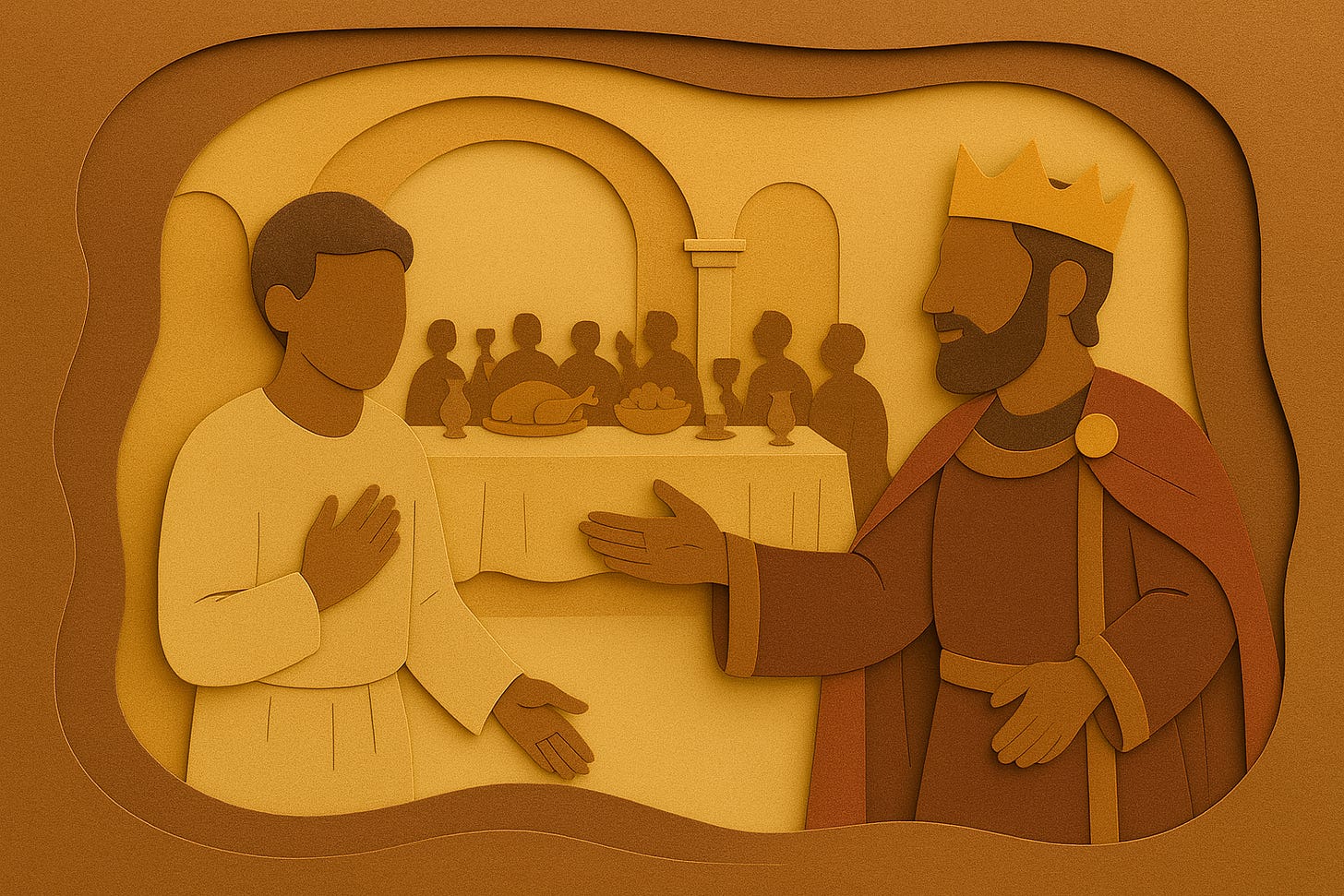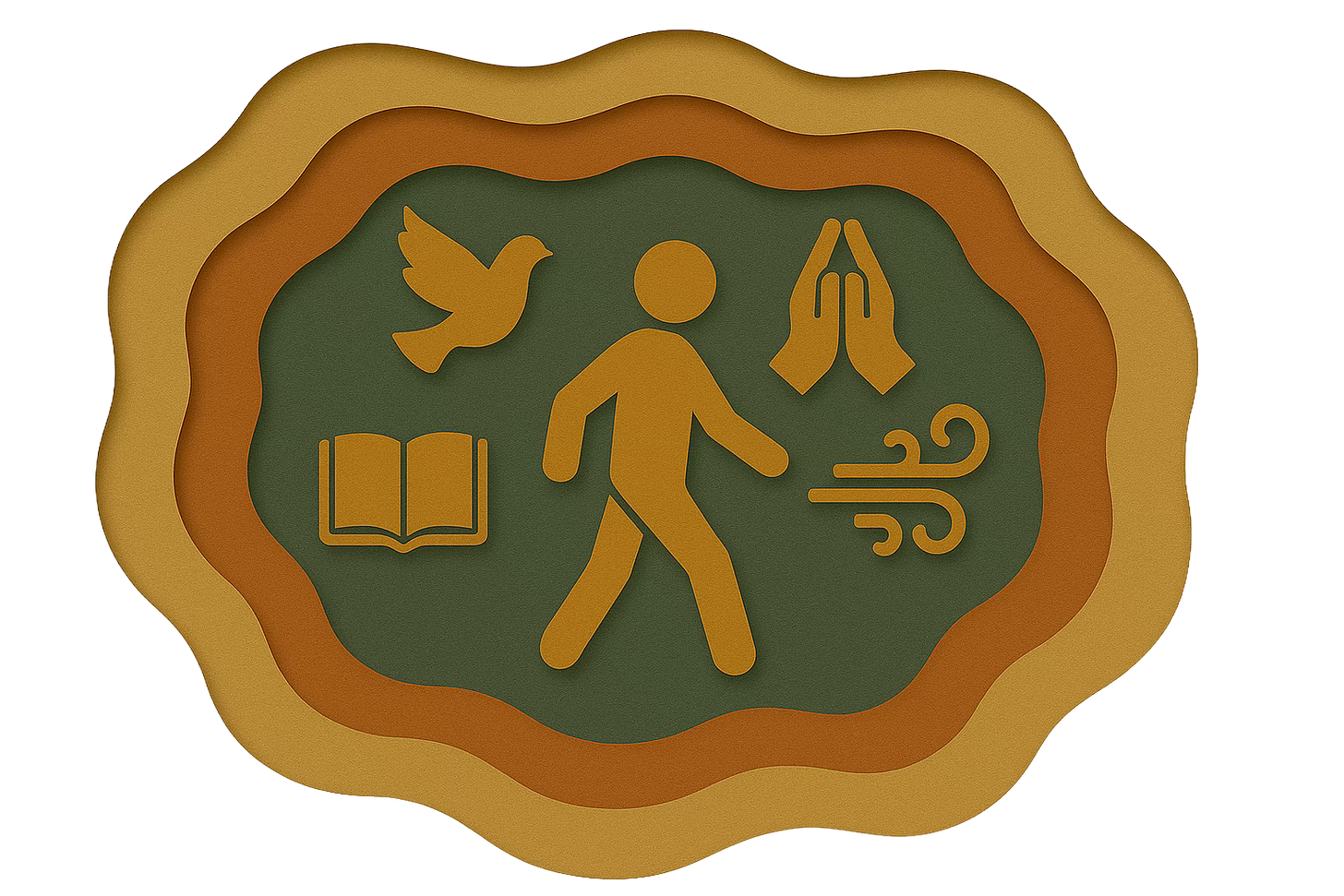The Wedding Banquet: Chosen and Clothed for Covenant
Why the Invitation Isn’t Enough: Receiving and Wearing the Garment of Covenant Faithfulness
Scripture: The Living Word
Imagine a royal wedding in the ancient Near East. Invitations are sent across the kingdom. The tables are set, oxen roasted, wine poured, music ready to play. But when the king’s servants arrive with the summons, the invited guests scoff. Some laugh and return to their farms, others hurry back to their businesses, and some even mistreat the messengers. Furious, the king turns to the streets—inviting the poor, the wanderers, the strangers. Soon the hall is full.
Then comes the twist: one man is found without a wedding garment. The king addresses him directly: “Friend, how did you get in here without wedding clothes?” He is speechless. Bound hand and foot, he is cast into outer darkness. Yeshua ends with these words:
“For many are called, but few are chosen.” (Matthew 22:14)
Featured Passage: Matthew 22:1–14
Context: Behind the Words
Levels of Invitation and Refusal
Yeshua layers this parable with different human responses to Yahweh’s covenant summons:
Excuses (farm, business): Distraction and apathy—loving the world more than the Kingdom (Luke 14:18–20).
Hostility (mistreating the servants): Rebellion and persecution—resisting Yah’s prophets, and ultimately Messiah Himself (Matthew 23:37).
Inclusion (guests from the streets): Grace and welcome—the outcast and marginalized now brought in (Isaiah 56:3–8; Romans 9:25–26).
Presumption (guest without clothes): Hypocrisy—entering outwardly but refusing to honor the King inwardly (Revelation 3:17–18).
Metaphors in the Parable
The King: Yahweh, extending His covenant through His Son.
The Banquet: The Kingdom of Heaven, both a present reality and the future wedding supper of the Lamb (Revelation 19:7–9).
The Invited Guests: Israel’s leaders, who held the Scriptures but rejected Messiah.
The Streets Filled with Guests: The nations (Gentiles) and the marginalized within Israel, now welcomed in.
The Wedding Garment: Not ordinary clothes, but covenant righteousness—being clothed in Messiah (Isaiah 61:10; Galatians 3:27).
Wedding Garments in the Ancient World
At royal weddings, hosts often provided garments for guests. To wear them honored the host; to refuse was an insult. Garments represented covenant identity:
Filthy garments = sin and rebellion (Zechariah 3:3).
Clean garments = holiness and covenant loyalty (Zechariah 3:4–5).
White robes = purity and eternal life (Revelation 19:8).
The man without wedding clothes dishonored the King by refusing His provision and pretending to belong on his own terms.
Aramaic vs. Greek vs. English
Yeshua likely said in Aramaic:
“Saggeé enon deqareen, ze‘ireen enon de-gabbīyē.”
“Many are summoned, but few are the chosen ones.”
Qareen (called): A covenant summons, like Israel called out of Egypt (Exodus 19:5–6).
Gabbīyē (chosen): Those picked out from the invited, accepted because they responded faithfully (cf. the wedding garment).
Baḥireen (chosen): Those tested and proven faithful, not merely picked at random (Deuteronomy 7:6–7). (Used in Matthew 24:24-31)
Greek terms softened this:
Kletos (called) meant “invited to assembly.”
Eklektoi (chosen) meant “selected,” often implying elites.
In English, “called” can sound vague, and “chosen” often gets reduced to predestination.
What Yeshua’s disciples would have heard
Israel summoned (qareen) into covenant.
Many refused or rejected (like the banquet invitees).
A smaller group accepted (gabbīyē), clothed in covenant faithfulness.
These are the true elect (baḥireen) — tested, proven, beloved — whom God preserves and gathers in the end.
When Yeshua told the parable of the wedding banquet, He ended with the haunting words: “Many are called, but few are chosen.” In Aramaic, those words carried a depth His disciples would not have missed. Everyone was qareen — summoned, just as Israel had been called out of Egypt into covenant at Sinai. But from that multitude of invited ones, only a smaller group were gabbīyē — the ones truly accepted, those who came clothed in the garment the King provided. It wasn’t about their works or merits. It was about whether they responded rightly to the covenant summons and received the King’s provision.
Later, in His teaching about the end of the age, Yeshua shifted the word. He spoke of the baḥireen — the elect, the proven ones. This echoed the language of Deuteronomy and Isaiah, where Israel was called Yahweh’s chosen not because of their strength or greatness, but because of His love and His covenant. These “elect” are not elites picked at random, but the faithful remnant who endure through trial, holding fast to trust in God’s promises and remaining clothed in righteousness.
Seen together, the two words form a covenant picture. All are summoned into God’s kingdom. The gabbīyē are those who heed the call, responding in faith to the invitation. The baḥireen are those same ones, now recognized as Yahweh’s beloved elect, preserved and gathered to Himself. The point is not works-righteousness, but covenant faithfulness — receiving the garment, walking in trust, enduring in loyalty to the King.
Covenant: The Relational Core
The parable reveals both the wideness and the narrowness of Yahweh’s covenant.
Inclusive: The banquet hall is filled with the poor, broken, and unexpected.
Exclusive: Only those clothed in the King’s provision remain.
Then: Proper clothing meant receiving the garment provided by the host and wearing it with honor.
Now: Proper clothing means both receiving Messiah’s righteousness and walking in His Way on the narrow path.
Gift: The garment is given by the King—Messiah clothes us with salvation (Isaiah 61:10; Galatians 3:27).
Practice: Wearing the garment means practicing the Way—following Yeshua’s teaching, walking in obedience, holiness, and love. This is the “narrow path” (Matthew 7:13–14).
Revelation 19:8 balances both: “It was granted her to clothe herself with fine linen, bright and pure—for the fine linen is the righteous deeds of the saints.”
The garment is grace given and practice lived.
Practice: Living It Out
One person may accept the invitation by joining church life, yet rely on their own moral reputation, wealth, or religious works—showing up in self-made clothes. Another may be overlooked and broken, yet clothed in Messiah’s righteousness, walking the narrow path of discipleship. The former dishonors the King; the latter honors Him fully.
This parable exposes the danger of believing that accepting the invitation in a single moment is enough. Many think saying a prayer, attending a service, or identifying as Christian secures their place at the banquet. But Yeshua shows that entering the hall is not the same as being properly clothed. The true test is whether we receive the King’s garment and continue to wear it in covenant faithfulness.
This is the difference between consumer Christianity and practicing the Way.
Consumer Christianity:
Treats faith as a product—a ticket obtained at one moment in time.
Attends the banquet but refuses the garment, preferring self-made coverings of reputation or cultural religion.
Says, “I accepted the invitation, isn’t that enough?”
Practicing the Way:
Receives Messiah’s garment as a gift, knowing we cannot clothe ourselves.
Wears it daily by walking the narrow path—forgiving enemies, showing mercy, living in holiness, loving sacrificially.
Says, “I will keep wearing the garment, following Yeshua on His terms, even when it costs me.”
The banquet is full of attendees, but only those clothed in Messiah and practicing His Way remain as the elect.
Takeaways
Excuses are rejection.
Hostility is rebellion.
Inclusion is grace.
Presumption is hypocrisy.
Proper clothing = Messiah’s gift and the practiced Way of discipleship.
Discussion Questions
Why do so many believe accepting the invitation once is enough?
What practices help us remain clothed in Messiah’s righteousness?
How can our community resist consumer Christianity and walk the Way together?
Seven-Day Practice Rhythm
Day 1 (🪞): Identify self-made garments you’ve trusted in (career, status, reputation). Repent.
Day 2 (🤝): Share a meal with someone overlooked by society as a picture of the King’s banquet.
Day 3 (🙏): Read Revelation 19:6–9; picture yourself clothed at the wedding feast.
Day 4 (🪞): Reflect on one area of your life where you live like a consumer; commit to practice the Way instead.
Day 5 (🤝): Encourage someone that the garment is Yah’s gift, not their achievement.
Day 6 (🙏): In worship, commit again to following Yeshua on the narrow path.
Day 7 (Sabbath): Rest in assurance: being elect is not about striving harder but abiding faithfully in Messiah’s covering.
Closing Blessing
May you hear the King’s summons not as suggestion but as covenant command. May you refuse distraction, resist hostility, reject presumption, and come clothed both in Messiah’s gift of righteousness and in the daily practice of His Way. And may you be counted among the faithful elect, rejoicing at the wedding banquet of the Lamb.






